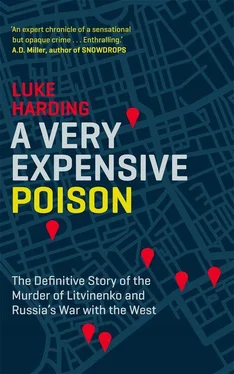The rendezvous took place in the upscale surroundings of the Westbury in Mayfair. The five-star hotel is close to Grosvenor Street and the scene of Litvinenko’s twin poisonings. Firestone was waiting in the Polo Bar. Security guards had taken up positions undercover; they had already waved a Geiger counter up and down. Perepilichnyy sauntered in – now a chunky, somewhat dowdy figure, wearing a tracksuit and no tie. He was distinctly underdressed for his posh surroundings and not quite the ‘minigarch’, or minor oligarch, they’d expected.
According to Jamison, Perepilichnyy began by saying in Russian: ‘It’s really terrible what happened to your colleague. I admire your work.’
Gradually it became clear that Perepilchnyy was genuine, and someone from the inside. Someone with a grudge. Stepanov had used his wife’s tax connections to destroy Perepilichnyy’s business empire – and now Perepilichnyy was retaliating. ‘This was a move in a war to get the heat off, to get them [the Stepanovs] to back down,’ Jamison said. ‘It was a business dispute between partners. Perepilichnyy wanted to rip the legs from under them.’
There were further meetings in the same bar in London, over green tea and biscuits. According to Ivan Cherkasov, a Russian lawyer working for Browder, who fled Russia, Perepilichnyy was uninterested in his surroundings. ‘He was someone who existed in a world of maths and logic,’ he said.
Perepilichnyy turned over more documents. They included statements showing payments of several million euros to Stepanov’s private Credit Suisse bank account. The money came from a Cyprus-based company, Arivust Holdings, also belonging to Stepanov. One source, who met Perepilichnyy several times, said: ‘He was a nice chap. He was bright. He seemed rational.’
Hermitage gave this material to the Swiss attorney general. Some sources say Perepilichnyy ignored advice from his brother-in-law in Moscow to drop his complaint. Swiss prosecutors then froze Stepanov’s account, containing €8 million. Other ‘investors’ using the same dubious schemes also saw their funds seized.
Soon afterwards, the threats from Moscow began. In 2011–12 Perepilichnyy told his Hermitage contacts that his situation was looking dangerous. ‘He tried to be cautious. He was a bit fatalistic,’ the source – who doesn’t want to be named – said. Perepilichnyy’s name turned up on a hit list recovered from a group of Chechen assassins arrested in France. The gang had a pretty accurate dossier on Perepilichnyy’s whereabouts in the UK, though some details were out of date.
More warnings followed. Perepilichnyy met in Geneva with someone who presented himself as an informal representative of Russia’s interior ministry. The representative passed on a message: that Perepilichnyy was to make a public statement saying that the wire transfers to Stepanov’s offshore accounts were completely legitimate. Failure to do so would result in the authorities in Moscow opening a money-laundering case against him.
In May 2012, Perepilichnyy held talks with Stepanov’s lawyer, Andrei Pavlov. Pavlov was on his way back to Russia; the venue was a café on the upper floor of London Heathrow Airport terminal five. It’s unclear what they discussed – though Pavlov claims that Perepilichnyy said he wanted a reconciliation with the Stepanovs and other unhappy former customers in Russia.
As for Stepanov himself, he denies wrongdoing. In a public letter in 2011, he said that he and Olga were divorced. He claims that the value of his designer mansion near Rublyovka – Moscow’s most exclusive district – has been overstated. Of Perepilichnyy, he said: ‘This man owes me a lot of money. As a matter of fact not only to me but to scores of other creditors. He cheated me by pocketing my money and assets.’
On 5 November 2012, Perepilichnyy held his last meeting with the team from Hermitage. ‘He was casually dressed. The photos of him are accurate, but the final time I saw him he was looking a bit skinnier,’ the source said. Like Litvinenko in Spain, Perepilichnyy had agreed to testify in a forthcoming trial in Switzerland into the $230 million fraud, where he would be the star prosecution witness.
Next, Perepilichnyy took the Eurostar to Paris. He spent three or four days there. Some sources suggest Ukrainian women were involved. Perepilichnyy appears to have worried about his security. He booked into three different hotels: the five-star George V, the Bristol, and a three-star guesthouse. He spent €1,200 in a Prada shop.
He returned by train to London. Back at home, his wife cooked him some sorrel soup. He told her he was feeling somewhat groggy. He decided to run this feeling off. And then he collapsed.
* * *
Detectives in Surrey were slow to grasp Perepilichnyy’s story – his links with shadowy figures in Moscow, his name on a Russian death-list, the emissaries and warnings. Instead, they treated his death as routine. There was, after all, no proof that this was murder. Nor were there any obvious suspects. Their assumption, it appears, was that Perepilichnyy’s death was due to cardiac arrest.
For those who knew FSB methods, however, the case looked deeply suspicious.
Before Litvinenko’s death, it might have seemed improbable verging on incredible that Russian assassins might murder someone on the streets of London. After Litvinenko, these doubts disappeared. Such murders had happened and were happening. The question for police was: was this one of them?
To Browder, the Perepilichnyy case looked like Litvinenko II. A week after his death, Hermitage’s lawyers wrote to the police detailing their concerns and asking for extensive toxicology tests to be carried out. The police didn’t reply. Another week passed. In frustration, Browder leaked the story to the Independent , owned by Alexander Lebedev, the Russian businessman and former KGB intelligence officer who had worked in the 1980s at the Soviet embassy in London.
There were many possible lines of inquiry. Hermitage’s lawyers urged the police to cooperate with the French authorities, and to obtain video surveillance in Paris and from Weybridge. Other avenues to examine included the movements of members of the Klyuyev group (the criminal gang headed by fraudster Dmitry Klyuyev), some of whom had travelled to the UK. There was Perepilichnyy’s possible dispute with Kovtun. And the fact that Eastern European contract killers were still entering the UK with ease.
Seven months earlier, a Moldovan assassin had ambushed another Russian in Canary Wharf in east London. The assassin, Vitalie Proca, had fired six shots into German Gorbuntsov, a 44-year-old Russian banker, as he returned home to his flat in Byng Street. Proca was caught on CCTV, gun raised. Gorbuntsov had fled to Moldova and then the UK after falling out – like Perepilichnyy – with wealthy clients in Moscow. They allegedly included senior figures in Russian Railways and the Solntsevo mafia gang. Gorbuntsov was badly wounded but survived.

The Surrey police investigation into Perepilichnyy’s death continued for some months. Toxicology tests conducted after twenty-two days drew a blank. Two post-mortems failed to uncover a cause of death. In 2013, detectives announced that there was no evidence of ‘third-party involvement’. The case – tragic, but apparently not homicide – was passed on to Surrey’s coroner. Browder was furious. ‘I’m certain he was murdered. The police kicked it into the long grass. This is a travesty of justice,’ he told me.
It wasn’t until spring 2015 that Browder’s suspicions were confirmed, and in quite spectacular fashion. Shortly before his death, Perepilichnyy insured his life for £3.5 million. He took out a flurry of policies. One, with Legal & General, worth £2 million, became active just eight days before he died. The insurer was reluctant to pay out. It asked a plant expert at the Royal Botanic Gardens in Kew, south-west London, Professor Monique Simmonds, to conduct her own tests.
Читать дальше













